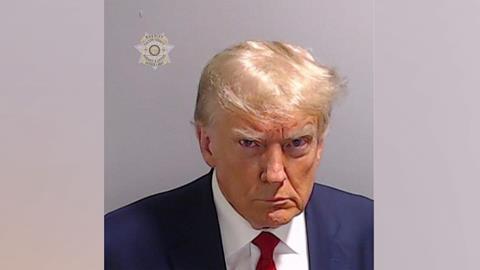As Donald Trump is arrested on charges of plotting to overturn the result of the last US election, Chine McDonald says his evangelical supporters are turning young people off the faith

As an unashamed scaredy-cat, I don’t watch horror movies, but if I did, the best way to be kind to my nerves would be to assume the worst is going to happen; that there is no escape; that the baddies are going to win.
Which leads me to Donald Trump.
The US presidential debates have kicked off and so begins the long, slow, tortuous campaign trail towards the White House next November. At the time of writing, polls show that among Republicans, Trump is 20 points ahead of his nearest rival, Ron DeSantis. Despite his misdemeanours – including allegedly making hush-money payments to porn actress Stormy Daniels – it looks like he will be competing against Joe Biden to be the next president of the United States. Unless he’s in prison. And who has stuck by Trump through the insurrections, criminal charges and cover-ups? Evangelical Christians.
Last time, I was naive. I hadn’t realised the grip Trump has on US evangelicals, nor the long history that led to where we are now. Last time, I was still on a quest to detoxify the brand of evangelicalism, attempting to communicate a more approachable evangelicalism that cared about justice and wanted to distance itself from white supremacy, patriarchy and misogyny. This time, my eyes are wide open. The days of rescuing evangelicalism from the grip of patriotism and power are over. The battle has been lost. At least, that is, in the US.
I’m not sure US evangelicalism will survive beyond another Trump term. Its alignment with a man whose behaviour and values run counter to what it is to be a good and decent human being may have already turned a generation away from what evangelicalism should be – that is: beliefs about Jesus, scripture and evangelism, rather than a narrow political position.
Despite all the misdemeanours, Trump support has hovered at around 70 per cent among white evangelicals (after 81 per cent of them voted for him in 2016). But I think it’s in the future of US evangelicalism where the negative impact will be felt. Because it’s a numbers game. The Republican Party’s members are predominantly older and white; the future of America will be ethnically more diverse. As younger generations age, they will be more likely to have no religion at all, and white evangelicals will make up a smaller percentage of the voting public.
Today’s young people will be turned off by rhetoric that says spiritual revival means a return to the nostalgia of a bygone era, signified in the numbers of people wearing Make America Great Again hats. Does Jesus really care about that? This is not what revival looks like. As evangelical preacher AW Tozer once wrote: “A widespread revival of the kind of Christianity we know today in America might prove to be a moral tragedy from which we would not recover in a hundred years.”
So I wait to see what happens, hoping that the face of Jesus will shine through the toxic power-grabbing; and that the behaviour of some American evangelicals won’t turn away a generation of young people closer to home. In the UK, where evangelicals are not tied to any particular party, and where there is still time to reimagine what the Christian faith might look like for this generation, hope remains. I pray it’s not too late.






































1 Reader's comment